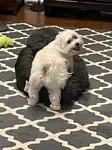9 Essential Senior Dog Diet Tips:
Having an excellent senior dog diet is essential for your older dog. As with humans, nutrition can play a huge part in the overall health of your dog – especially as he gets older. A high quality dog food can prevent obesity, allergies, intestinal problems, and skin disease.
Dogs are actually living longer than ever before and one of the main reasons is improved nutrition. We know so much more about proper nutrition today and thankfully, this means more time with our beloved pets.
Because your dog’s needs are different as a senior than they were as a puppy, you should feed your senior dog food that is especially designed for the older dog.
Just like us, when dogs get older their metabolism slows, they tend to exercise less, and they sleep more. Because of these changes in lifestyle, they also need a change in diet in order to ensure they don’t gain weight and that they eat foods that are easy to digest and that have the proper nutrients for their aging organs, joints, skin and coat.
There isn’t one food that’s perfect for all senior dogs so you may have to experiment at first to find the best food for your dog.
Here are some important things to consider for a senior dog diet:
- Make sure your older dog gets plenty of fresh water to keep him hydrated which helps his body function at its best. Water is especially important to your dog in hot weather or after exercising.
- Eliminate dairy food and high fat foods such as milk and cheese from your dog’s diet since they can add dangerous pounds and can cause digestion problems.
- Look for food that is high in easy to digest protein, lower in fat and calories and has a good source of nutrients and fiber. Today there are many pet foods that are specially formulated for senior dogs which makes it so much easier.
- Ask your Vet for recommendations based on your dog’s age, breed, size, and medical history.
- A senior dog diet should include antioxidants such as vitamin E and beta carotene which helps reduce free radicals that can damage tissues and cause signs of aging. They can also improve your older dog’s immune system.
- Make changes in your dog’s diet by gradually incorporating the new food a little at a time.
- Supplements are usually not necessary when you choose a high quality food.
- Choosing all natural holistic foods can be beneficial for your older dog.
- Many of us grew up equating food with love, but feeding table scraps can cause unnecessary medical problems, especially for an older dog. If you want to “reward” your older dog with food, select high quality dog treats that provide nutrition – not just empty calories.
Can you identify with this video?








